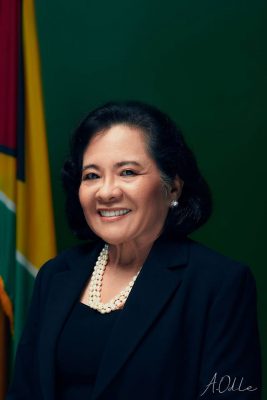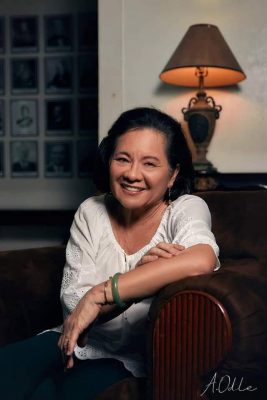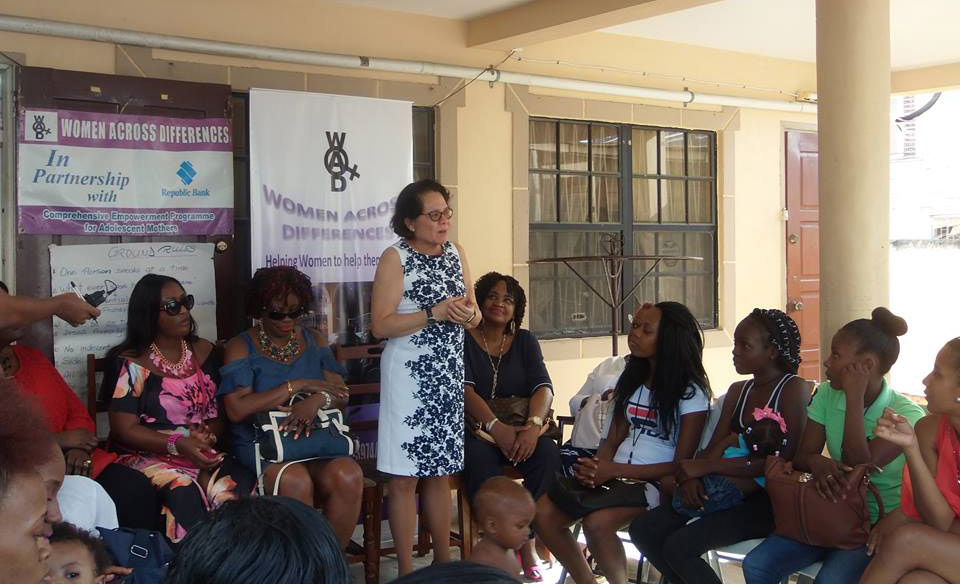For four years, First Lady Sandra Granger has been quietly working with Guyana’s youth, especially those who are vulnerable. While there have been a few challenges, the positives far outweigh the negatives and for her the key is not to be entangled in politics.
Some might argue that this is impossible since her husband is the president of the country, but in a sit down with the Sunday Stabroek she revealed that she tries to be very careful that “I don’t get into any kind of political imbroglio.”
Importantly, she makes sure that the work she does is not only beneficial, but what people want as she does not force anything on anyone and there have been instances where persons were told not to participate because it is a “government thing.” But that aside there has been tremendous support for the various programmes.

Mrs Granger is very concerned about upsurge in domestic violence in the country and the violence meted out to young girls and boys, who are in many cases raped by adults. She pointed out that young girls are impregnated by older men who should know better.
“It is something bubbling in our society. I am not a psychologist, but it bothers me when I pick up the papers and read about somebody raping a girl… and it happens to boys as well. And it does not happen only in poor families or rural families, it happens in the city, it happens in middle class and well-to-do families. So, we have to say what are the things that are creating this social disorder among us?… the First Lady questioned.
She also pointed out that while some men are hauled before the courts, others, even though their crimes are known, are protected by those around them.
She posited that those in the field of social work and psychology need to do more to try to understand what drives such behaviours.
“What drives a man to say well you have no right to leave me, I have the right to pound the living daylights out of you and you better stay and take it because I am the boss here?” she questioned, adding that it also happens among very young people as well.
She pointed out that it is not only happening in Guyana and it appears as if the male ego is threatened by any sense of female assertiveness and woman have to face a constant barrage of: ‘you are worth nothing’, ‘you bring nothing into this house’ and ‘if it wasn’t for me’.
Asked whether she felt the system was failing or women and girls, the First Lady said she did not think it was the system alone that was failing women as the country has all the legislation in place and organisations which are supposed to oversee their implementation and encourage women’s development.
“But at the same time, we have a society where the neighbour says nothing when the wife is being beaten up every single week… Or the family will keep sending the wife back even though she is just brutalised by the husband because he gives the parents a small piece now and then and he has a big house and big position and power…,” she said.
She shared that she has also heard of cases where men in the mining areas hold lotteries for young girls and many of them have children older than the girls. For her this points to a kind of disconnect, a wearing away of country’s social fabric.
She believes that part of the solution to this lies in teaching children to value themselves and others and it is also important that children are taught about sexual and reproductive health even though there are some in society who push back against this information being given to children.
The First Lady also suggested that maybe in some of domestic violence cases where there was no great physical harm to the victim, the perpetrator, instead of being sent to jail, could be placed in a mandated programme that would teach them to respond differently to issues and also teach them about responsibility and being a role model. “I think it is something we have to start looking at and it is not something that will be partisan or defined according to society’s strata but rather something we look at in a very holistic way and say these are the things we need to look at…,” the First Lady said, adding again that she was neither a psychologist nor a social worker.
Broken society
The First Lady said that when planning projects, she takes into consideration the fact

that this is a broken society in an effort to help young people to understand who and what they are, the value they have and what they can bring to their families, communities and society.
“And so, it is always a pleasure to see that kind of light bulb go off in people’s minds,” she told this newspaper.
Her work has been mainly focussed on education and empowerment, mostly among the country’s vulnerable population and while there is need for more, she believes that there has been some progress.
Mrs Granger has been involved in literacy programmes at four schools in the Buxton/Friendship and Lusignan communities. The programmes provide remedial classes for children in the afternoon three days a week; the children are given a meal before the classes begin. The meals were included because many of the children are from poor families. The schools identified the struggling children, but also those who do well but have some other difficulties and they are taught together.
“We have seen literacy rates go up. We have seen more kids getting the kind of grades at the National Grade Six exams which enable them to go to high school, which has been am improvement,” Mrs Granger said.
But apart from the above success the First Lady is pleased with the fact that teachers, cleaners, communities and parents have all played a part in supporting the initiative and by extension helping to give the beneficiaries an opportunity to gain an education.
She calls the programme her “focal project” and if funding were to become available, she would very much like to expand it to other communities, but for now there is just enough to pay a small stipend to the teachers and provide the meals for the children. The First Lady revealed that the bulk of the money goes towards food for the children. A bus is also provided to take some of the children in the Buxton area to the Friendship Primary School where classes for three schools are held. In Lusignan there is only one school and the classes are held at that location for those children.
ICT
Another of the First Lady’s projects is the adolescence and out-of-school youth information and communications technology (ICT) workshops, which focus on young people who want to be employed but who had dropped out of school for various reasons. A literacy module is also incorporated in this programme along with ICT, micro-finance, robotics and sexual and reproductive health. It also teaches the participants things like how to dress for work, how to speak to colleagues and supervisors, importance of punctuality, attitude at work and putting away one’s cellular phone when working among others.
“The most popular module we have had in every workshop is the sexual and reproductive health one because the young people learn a lot of, as I would say, true facts about sexuality and reproductive health and gender and all the rest of it. They come up with a better understanding about themselves,” the First Lady shared.
A cohesive team, she said, goes around and focuses on the children outside of Georgetown with the support of the Board of Industrial Training. Last year the team was in Lethem, Leonora, Linden and Anna Regina. This year, at the request of the Bina Hill Institute in Region Nine the team travelled to that location. It is hoped that Mabaruma and Mahdia will also be visited. Bartica is not included because the Office of Climate Change has an ongoing project in the community and the First Lady said when choosing a location internet connectivity is a factor because this is needed.
Mrs Granger explained that the workshops last for about four to five weeks and involve six days of all-day tutoring; every workshop has been oversubscribed. At times older folks would grumble that they want workshops as well, but the First Lady said they are really designed to get the young people one step into employability and being comfortable in that space.
Pointing to the success of the programme, she said some of the graduates have been employed both in the public and private sectors and others were able to complete their secondary education.
Apart from the above programmes the First Lady also has robotic clubs and she made a point to state that she is proud of them. She also mentioned that the budget that is given to her office only covers the remedial classes initiative in the four schools and everything else depends on donations.
“I think that we have been very fortunate with so many people [who] see the value of our projects. I go abroad or I go somewhere and people say ‘you know I like what you are doing with the young people and the robotics, I am going to give you a donation to that,’” she said, adding that the donors are later informed what was done during the specific initiative.
The Office of the First Lady also produces an annual report highlighting its work and Mrs Granger views it as accountability which makes people more comfortable.
Teenage mothers
Her work also includes working with Women Across Differences, an organisation that focuses primarily on helping teenage mothers, which involves teaching them to care for children along with equipping them with various skills.
Some of the programmes also teach young people to care for the elderly and based on the advice of Volda Lawrence when she was Minister of Social Protection, also involve first aid and CPR taught by the Guyana Red Cross Society.
At the end of all of the programmes, the successful participants receive certificates through the Board of Industrial Training.
Mrs Granger expressed concern for those persons who gain employment to care for the elderly, but are at times asked to do domestic work, as well as the hours they are asked to work.
“So we really have to look at how you protect the persons who are doing those jobs and help people recognise that this is a skill people learnt,” the First Lady said, adding that persons have to like looking after young children or older people to be effective at what they do.
To assist those involved in the care for the elderly, they in the past been paired with residents of the Palms as some of them have never had contact with old people.
There are also self-reliance and success workshops which have benefited mostly women, though there have been a few men. These are done by Interweave Solutions in Guyana, which is associated with the Church of Jesus Christ of Latter Day Saints, and teach all the ins and outs of running a business, with focus on the person’s well-being while taking into account the family and community.






